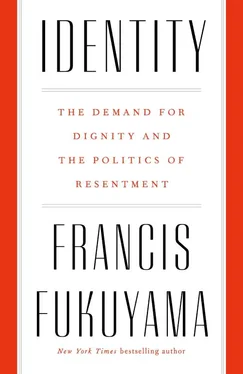The type of identity politics increasingly practiced on both the left and the right is deeply problematic because it returns to understandings of identity based on fixed characteristics such as race, ethnicity, and religion, which had earlier been defeated at great cost.
On the left, proponents of narrow identity politics assert that the U.S. identity is its diversity, or that we are somehow united by our diversity. Others have argued that the United States is too diverse to have a national identity, and that we shouldn’t worry about it one way or the other. In light of the populist understandings of identity that have lately arisen, it is understandable why people retreat to diversity as a virtue. To say that the United States is a diverse society is true. But diversity cannot be the basis for identity in and of itself; it is like saying that our identity is to have no identity; or rather, that we should get used to our having nothing in common and emphasize our narrow ethnic or racial identities instead.
On the right, some have retreated into earlier versions of identity based on race and religion. Former Republican vice-presidential candidate Sarah Palin once characterized “real Americans” as those residing in small towns and rural areas, something that deliberately excluded the diverse populations of U.S. cities. Donald Trump has taken this view to new heights, awakening an ugly form of populist nationalism that would reassert an ethnic or religious understanding of the country. As he said at one campaign rally in 2016, “The only important thing is the unification of the people” because “the other people don’t mean anything.” {20} This implies in practice that the “real people” expel or somehow forcibly exclude the “other people” from civic life—not a formula for national unity, but for civil war.
Many theorists of modern democracy have argued that passive acceptance of a democratic creed is not enough to make such a system work. Democracies require certain positive virtues on the part of citizens as well. Alexis de Tocqueville in particular warned of the temptation of people in democratic societies to turn inward and preoccupy themselves with their own welfare and that of their families exclusively. Successful democracy, according to him, requires citizens who are patriotic, informed, active, public-spirited, and willing to participate in political matters. In this age of polarization, one might add that they should be open-minded, tolerant of other viewpoints, and ready to compromise their own views for the sake of democratic consensus.
Samuel Huntington was one of the few contemporary political thinkers to make an argument that the success of the United States as a nation depended not just on a minimal creedal understanding of identity, but on certain cultural norms and virtues as well. In his final book, Who Are We? , he famously asked, “Would America be the America it is today if in the seventeenth and eighteenth centuries it had been settled not by British Protestants but by French, Spanish, or Portuguese Catholics? The answer is no. It would not be America; it would be Quebec, Mexico, or Brazil.” {21} He talked about what he called Anglo-Protestant culture as a necessary component of American identity, a culture that was built around the Protestant work ethic.
Huntington was denounced as a racist and, more recently, as an academic precursor to Donald Trump. {22} A proper understanding of Huntington’s argument, however, would exonerate him of charges of racism, even if one disagreed with his policy prescriptions on immigration.
Huntington was not making an argument for an Anglo-Protestant understanding of American identity if that meant that only Anglo-Saxon Protestants could qualify as Americans. Rather, he was saying that the Anglo-Protestant settlers to the United States brought with them a culture that was critical for the subsequent development of the country as a successful democracy. The culture is important, not the ethnic or religious identities of those who take part in it. His view is, in my opinion, undeniably true.
One of the elements of that culture that Huntington emphasized was the “Protestant” work ethic. Empirically, Americans do work much harder than many other peoples around the world—less hard than many Asians, but certainly harder than most Europeans. {23} The historical origins of this work ethic may indeed lie in the Puritanism of the country’s early settlers, but who in the United States works hard these days? It is just as likely to be a Korean grocery-store owner or an Ethiopian cabdriver or a Mexican gardener as a person of Anglo-Protestant heritage living off dividends in his or her country club. While we can acknowledge the historical roots of this culture, we must also recognize that it has become detached from its particular ethno-religious origins to become the common property of all Americans.
Huntington was, in my view, wrong to fear that Mexican immigrants would not eventually adopt Anglo-Protestant values and habits. Empirically, this worry would seem to be overblown. He was more justified in his concern that contemporary understandings of multiculturalism and identity politics were putting up unnecessary barriers to assimilation, barriers that did not exist for earlier generations of immigrants.
The question is not whether Americans should go backward into an ethnic and religious understanding of identity. The contemporary fate of the United States—and that of any other culturally diverse democracy that wants to survive—is to be a creedal nation. But it also needs an understanding of positive virtues, not bound to particular groups, that are needed to make that democracy work. While it would be wrong today to link identity to race, ethnicity, or religion, it is correct to say that national identity in a well-functioning democracy requires something more than passive acceptance of a creed. It requires citizenship and the exercise of certain virtues. A creedal identity is a necessary but not a sufficient condition for success.
We cannot get away from identity or identity politics. Identity is the “powerful moral idea that has come down to us,” in Charles Taylor’s phrase, and it has crossed borders and cultures since it builds on the universal human psychology of thymos. This moral idea tells us that we have authentic inner selves that are not being recognized and suggests that the whole of external society may be false and repressive. It focuses our natural demand for recognition of our dignity and gives us a language for expressing the resentments that arise when such recognition is not forthcoming.
That the demand for dignity should somehow disappear is neither possible nor desirable. It was the spark that ignited countless popular protests, from the French Revolution to that of the disrespected street vendor in Tunisia. These people wanted to be treated like adults, adults who were able to influence the governments that lorded over them. Liberal democracy is built around the rights given to individuals who are equal in their freedom, that is, who have an equal degree of choice and agency in determining their collective political lives.
But many people are not satisfied with simple equal recognition as generic human beings. The rights one enjoys as a citizen of a democracy are highly valued when one lives under a dictatorship, but come to be taken for granted over time once democracy has been established. Unlike their parents, young people growing up in Eastern Europe today have no personal experience of life under communism, and can take the liberties they enjoy for granted. This allows them to focus on other things: the hidden potentialities that are not being permitted to flourish and the way that they are being held back by the social norms and institutions around them.
Читать дальше












